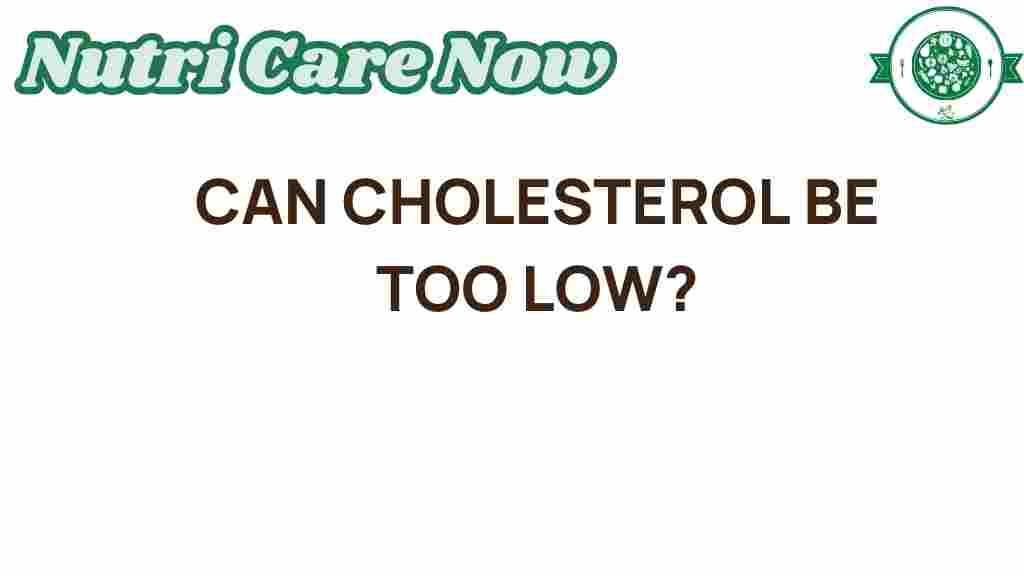The Surprising Risks of Low Cholesterol Levels Uncovered
When we think about cholesterol, the first image that often comes to mind is that of a villain in the realm of heart health. For decades, we’ve been warned about the dangers of high cholesterol levels, leading many to strive for a drastically low cholesterol level in their quest for wellness. However, emerging medical research is uncovering a surprising reality: low cholesterol levels may also pose significant health risks. In this article, we will explore the relationship between cholesterol and health risks, especially concerning cardiovascular health, nutrition, and dietary balance.
Understanding Cholesterol and Its Role in the Body
Cholesterol is a waxy substance found in your blood and cells. It is essential for various bodily functions, including:
- Building cell membranes
- Producing hormones
- Creating vitamin D
- Forming bile acids to digest fat
Cholesterol travels through the bloodstream in lipoproteins, primarily low-density lipoprotein (LDL) and high-density lipoprotein (HDL). While LDL is often dubbed “bad cholesterol” for its association with plaque buildup in arteries, HDL is considered “good cholesterol” because it helps remove LDL from the bloodstream.
Myths Surrounding Low Cholesterol
There are numerous myths about cholesterol that contribute to misunderstanding its role in health:
- Myth 1: All cholesterol is bad.
- Myth 2: Low cholesterol means better health.
- Myth 3: Only high cholesterol is a risk factor for heart disease.
These misconceptions can lead individuals to pursue excessively low cholesterol levels without considering the potential consequences.
The Health Risks of Low Cholesterol Levels
Recent medical research has begun to highlight the potential health risks associated with low cholesterol levels. Here are some key points to consider:
1. Increased Risk of Hemorrhagic Stroke
Studies have shown that individuals with low cholesterol levels may have an elevated risk of hemorrhagic strokes, which occur when a blood vessel in the brain bursts. While the exact mechanisms are still being studied, it’s believed that cholesterol plays a role in maintaining the integrity of blood vessels.
2. Hormonal Imbalances
Cholesterol is crucial for hormone production, including sex hormones like testosterone and estrogen. Low levels of cholesterol can lead to hormonal imbalances, affecting everything from mood to reproductive health.
3. Nutritional Deficiencies
Cholesterol-rich foods are often sources of essential nutrients. A diet overly restricted in cholesterol may lead to deficiencies in vitamins and minerals, impacting overall health and wellness.
4. Mental Health Issues
Some medical research suggests a correlation between low cholesterol levels and an increased risk of depression and anxiety. Cholesterol is involved in brain function, and insufficient levels may affect mood-regulating neurotransmitters.
5. Impaired Immune Function
Cholesterol is necessary for the proper functioning of immune cells. Low levels may impair the immune response, leading to a higher susceptibility to infections and diseases.
Maintaining Dietary Balance for Optimal Cholesterol Levels
Achieving a healthy balance of cholesterol is crucial for cardiovascular health. Here are some tips for maintaining a balanced diet:
- Incorporate Healthy Fats: Include sources of healthy fats such as avocados, nuts, seeds, and olive oil in your diet.
- Eat Whole Foods: Focus on whole grains, fruits, and vegetables that provide essential nutrients without contributing to unhealthy cholesterol levels.
- Limit Processed Foods: Reduce the intake of processed foods high in trans fats and sugar, which can negatively impact cholesterol levels.
- Engage in Regular Physical Activity: Exercise can help improve cholesterol levels and overall heart health.
Step-by-Step Process to Assess Your Cholesterol Levels
To ensure your cholesterol levels are in a healthy range, follow this step-by-step process:
- Consult Your Healthcare Provider: Schedule a checkup to discuss your cholesterol levels and overall health.
- Get a Lipid Profile Test: This blood test measures total cholesterol, LDL, HDL, and triglycerides.
- Review Your Results: Understand what your cholesterol levels mean and discuss any concerns with your doctor.
- Develop a Dietary Plan: Work with a nutritionist to create a balanced diet that supports healthy cholesterol levels.
- Monitor Regularly: Keep track of your cholesterol levels through regular checkups and blood tests as recommended by your doctor.
Troubleshooting Tips for Managing Cholesterol Levels
If you find yourself struggling to manage your cholesterol levels, consider these troubleshooting tips:
- Evaluate Your Diet: Keep a food diary to identify any unhealthy eating patterns.
- Stay Hydrated: Drink plenty of water throughout the day to support overall health.
- Find Support: Join a wellness group or find a buddy to help keep you accountable.
- Educate Yourself: Stay informed about cholesterol and heart health through reputable sources. For more information, you can refer to this American Heart Association resource.
Conclusion
While high cholesterol levels have long been associated with increased health risks, the emerging evidence regarding low cholesterol levels is just as concerning. It’s essential to maintain a balanced approach to cholesterol through proper nutrition and lifestyle choices. Understanding the surprising risks of low cholesterol can empower individuals to make informed decisions regarding their health and wellness. As medical research continues to evolve, staying educated and proactive about your cholesterol levels can significantly impact your cardiovascular health and overall well-being.
To learn more about maintaining a healthy diet and understanding cholesterol, visit this helpful link.
This article is in the category Health and created by NutriCareNow Team
